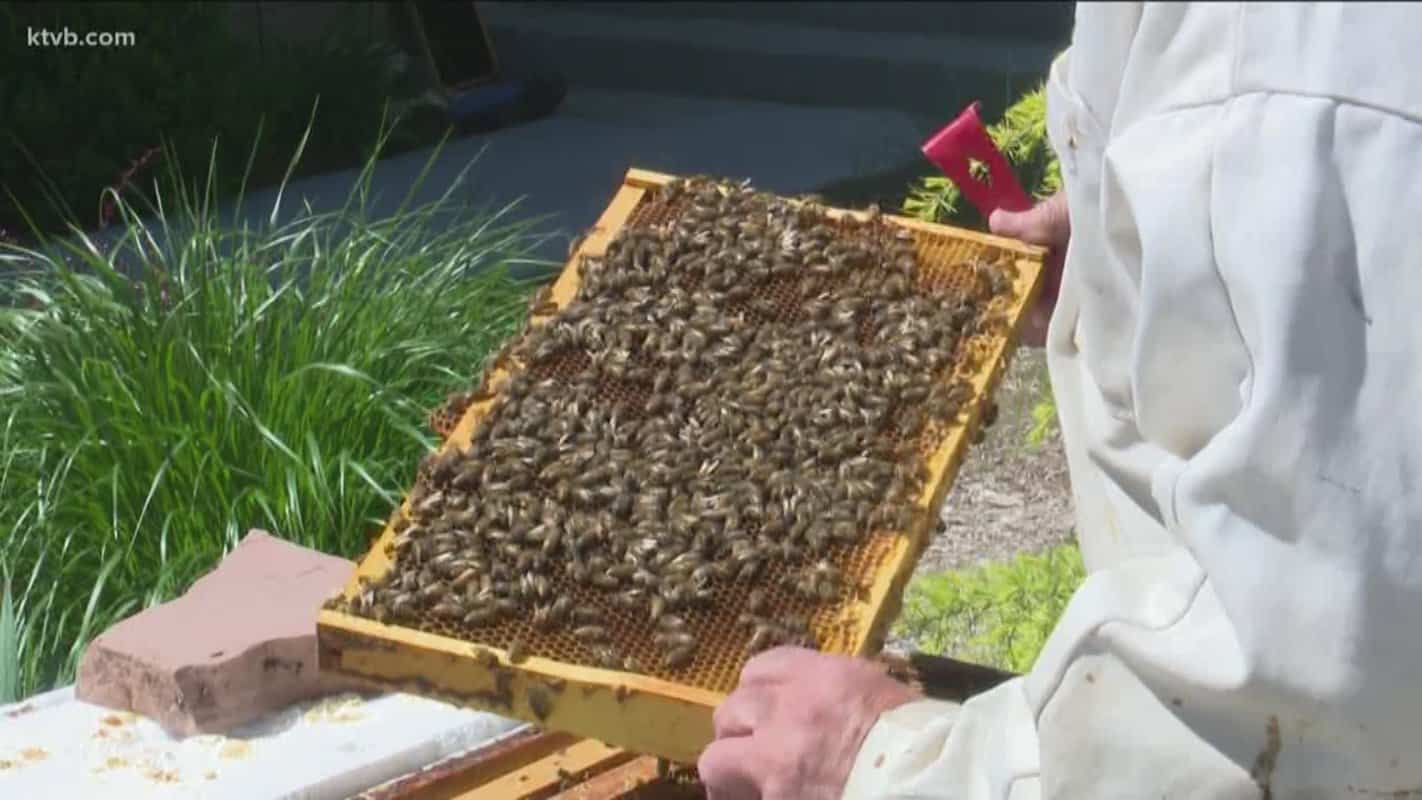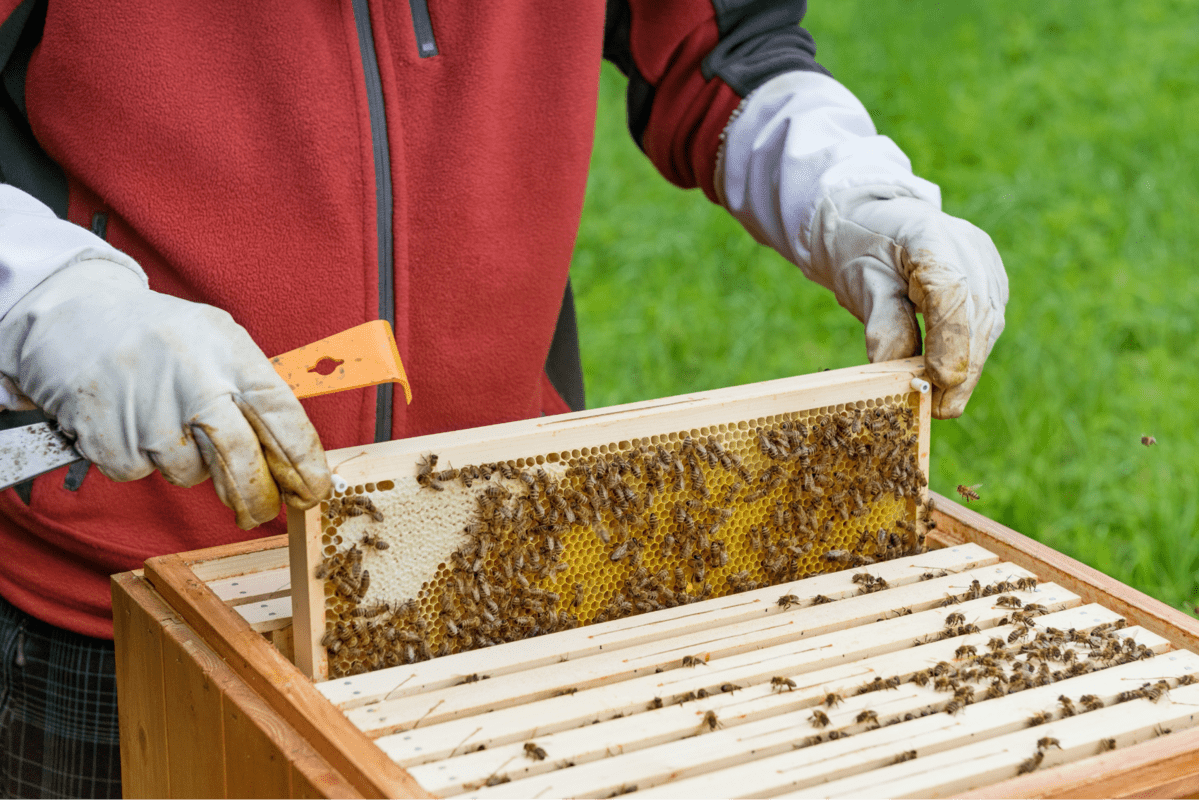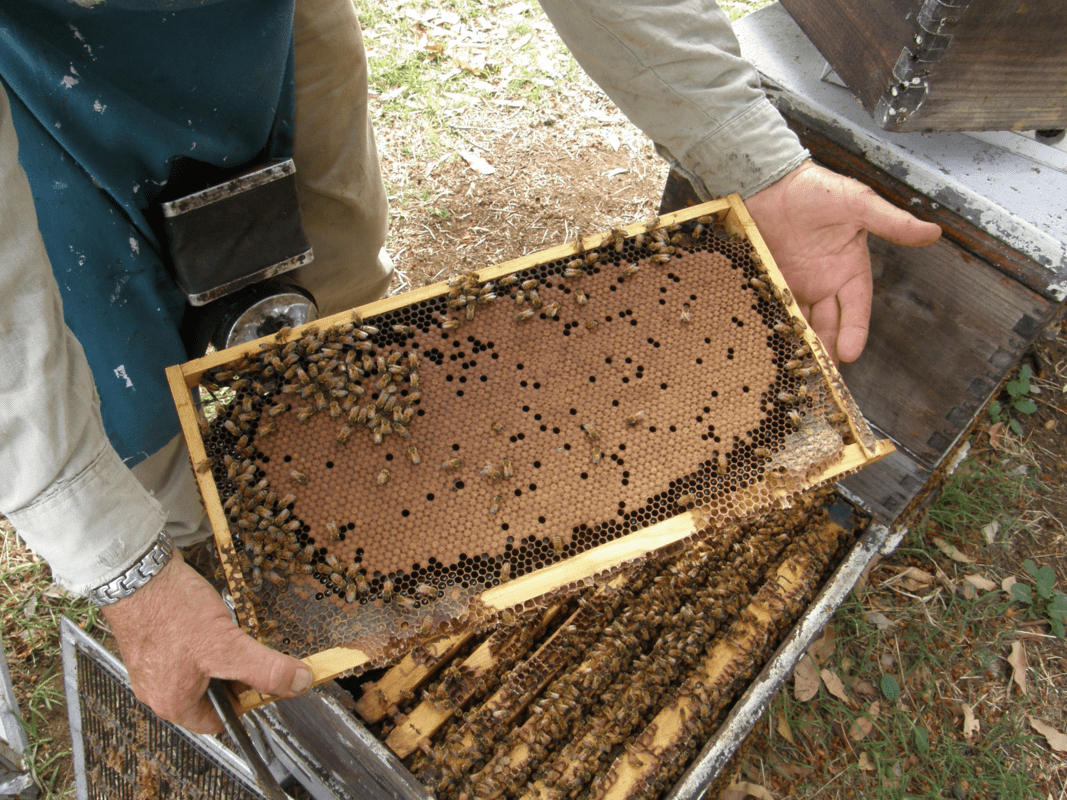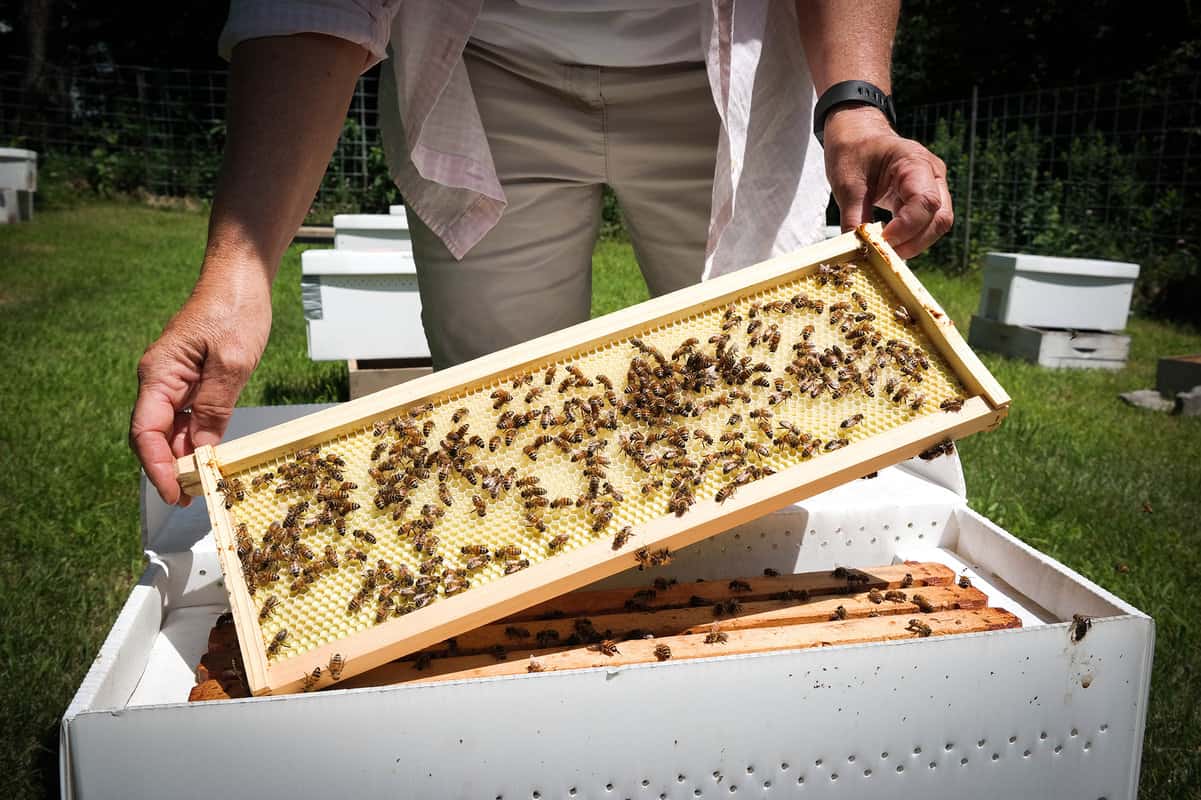Does ammonia really kill bees? This is a question that many beekeepers have been asking. The answer is not always an easy one, as there are many factors that can affect how ammonia affects bees. This article provides beekeepers with a guide to understanding how ammonia can affect their hives and what they can do to keep their bees healthy. By understanding the effects of ammonia on bees, beekeepers can make informed decisions about how to best care for their hives and keep their bees safe.
What is Ammonia?
Ammonia is a chemical compound composed of nitrogen and hydrogen. It is widely used in a variety of industries, including cleaning products, fertilizers, and industrial manufacturing. In its gas form, ammonia has a strong, pungent odor and is highly toxic to both bees and other insects.
Will Ammonia Kill Bees?
Yes, because ammonia is toxic to bees and other insects, it can be a dangerous element to keep in or around a beehive. It can cause death, or if not lethal, can damage the bees’ respiratory system, reducing their ability to forage for food and pollinate flowers.
It is important for beekeepers to be aware of the amount of ammonia in their hives and environment. Ammonia levels can be monitored by regularly testing the air in the hive, as well as the frames and honeycomb. If the levels are too high, beekeepers must take steps to reduce it, such as providing more ventilation, or using a special type of filter.
Beekeepers should also ensure that any cleaning products they use are free from ammonia, as even small amounts can be harmful to the bees. It is also important to check the hives for any damaged frames and honeycombs, as this can increase the amount of ammonia in the hive.
By taking the necessary precautions, beekeepers can help ensure that their hives remain healthy and free from ammonia.
Will Ammonia Kill Bees?

Yes, ammonia is toxic to bees, and can cause death if too much is ingested or inhaled. Bees are particularly sensitive to ammonia, as it can interfere with their delicate respiratory system.
- Ammonia exposure can be lethal to bees and can cause death in just a few minutes.
- Bees can become sick or die from exposure to high levels of ammonia in the air or water.
- Ammonia breaks down the protective wax coating of a bee’s body, which can lead to infection and death.
- Bees can also become disoriented and confused after exposure to ammonia, causing them to lose their way back to the hive.
- Ammonia can also reduce a bee’s ability to find food, leading to starvation.
- Ammonia can also be absorbed through a bee’s skin, leading to serious health issues and even death.
Since ammonia can be so toxic to bees, it is important for beekeepers to take precautions when using it around their hives. The best way to keep your hive healthy is to keep your hive clean and free of any ammonia. Make sure to keep your hive away from sources of ammonia, such as fertilizer and cleaning products. If you need to use ammonia, make sure to use it in the proper concentrations and only use it when absolutely necessary.
How Ammonia Affects Bees

Is Ammonia Toxic to Bees?
The answer is yes. Ammonia is a toxic compound, and exposure to high levels of it can cause severe respiratory and digestive issues in bees. It can also cause the bees to become disoriented, leading to death. In addition, exposure to ammonia can reduce the lifespan of bees, making them less productive and more susceptible to disease.
Effects of Ammonia on Bees
The effects of ammonia on bees can be both physical and psychological. Physically, bees exposed to high levels of ammonia can suffer from respiratory and digestive problems, as well as reduced lifespans. Psychologically, bees exposed to ammonia can become disoriented and confused, leading to decreased productivity and even death. Additionally, ammonia can also interfere with the bees’ ability to communicate and may cause them to become aggressive.
In order to keep bees healthy, beekeepers should avoid using ammonia in their hives. Instead, beekeepers should use methods such as proper ventilation and bee-friendly cleaning products to keep the hive clean and safe.
How to Keep Your Hive Healthy

Managing & Preventing Ammonia
Beekeepers need to be aware of the risks of ammonia accumulation in a bee hive. Ammonia is a by-product of the breakdown of organic matter and can be toxic to bees in large concentrations. To prevent ammonia accumulation, beekeepers should ensure that their hives are well-ventilated and regularly checked for signs of accumulation. Additionally, beekeepers can reduce the risk of ammonia buildup by managing the hive’s temperature and humidity.
Common Causes of Ammonia in a Bee Hive
Ammonia buildup in a bee hive can be caused by a number of factors, including: poor ventilation, overcrowding of bees, and too much moisture. Poor ventilation can lead to an accumulation of ammonia, as the gases and moisture produced by the bees are not able to escape the hive. Overcrowding of bees can also lead to an accumulation of ammonia, as the bees create more waste in a smaller space. Too much moisture in the hive can also lead to an accumulation of ammonia, as the moisture will not be able to evaporate, resulting in a buildup of dangerous gases. Beekeepers should be aware of these factors and take steps to prevent ammonia accumulation in their hive.
Other Potential Diseases & Pests
- Varroa Mites – These mites feed on bee larvae and adult bees, weakening the bee’s immune system and making them susceptible to other diseases.
- Small Hive Beetles – These beetles lay eggs in colonies and can cause serious damage to the hive through the destruction of comb and honey.
- Foulbrood – Foulbrood is a bacterial disease that affects the larvae, causing them to become deformed and die.
- Chalkbrood – This is a fungal disease that affects the larvae and can cause them to become discolored and die.
Frequently Asked Questions
What Other Methods Can Be Used to Keep Bees Healthy?
Regular inspections and maintenance of beehives is essential to assessing the health of a colony. During these inspections and maintenance, beekeepers should check for any signs of pests and diseases, and take appropriate steps to treat them. In addition, beekeepers should provide the hive with adequate food sources, water, and shelter. Other methods of keeping bees healthy can include the use of essential oils and other natural remedies, using pollen traps, and using feeding supplements such as sugar syrup and protein supplements.
Are there any risks associated with using ammonia to kill bees?
Using ammonia to kill bees can be hazardous to humans and animals. Inhaling ammonia can cause serious respiratory issues and even death. Additionally, ammonia can cause skin and eye irritation. If it is spilled, it can also contaminate soil and water. Therefore, it is important to take necessary precautions when using ammonia to kill bees.
How often should ammonia be used to keep bees healthy?
Ammonia should be used sparingly and only when absolutely necessary to keep bees healthy. If the hive is overcrowded, or if there is a build-up of debris and wax inside, ammonia can be used to clear the air and help maintain a healthy environment. However, over-use of ammonia can be harmful, leading to respiratory issues and even death in some cases. Therefore, it is important to use ammonia only as needed, and in small doses.
What Precautions Should Be Taken When Using Ammonia to Kill Bees?
When using ammonia to kill bees, it is important to take the necessary precautions to ensure safety. Wear protective gear such as a long-sleeved shirt, long pants, and a face mask to protect your skin and respiratory system from contact with the ammonia. Also, ensure the area is well-ventilated, as the fumes can be hazardous. Use caution when applying the ammonia, as it can be dangerous to other animals and plants in the vicinity. Finally, make sure the bees are completely dead before removing the hive.
What other pests can be controlled with ammonia besides bees?
- Ants: Ammonia can be used to repel ants, as they are sensitive to the pungent odor. Spraying a solution of ammonia and water directly on ant trails can help keep them away.
- Cockroaches: Ammonia can be used to repel cockroaches, as they are also sensitive to the pungent odor. Spraying a solution of ammonia and water directly on cockroach trails can help keep them away.
- Moths: Ammonia can be used to repel moths, as they are also sensitive to the pungent odor. Spraying a solution of ammonia and water directly on moth trails can help keep them away.
- Spiders: Ammonia can be used to repel spiders, as they are also sensitive to the pungent odor. Spraying a solution of ammonia and water directly on spider webs can help keep them away.
- Fruit Flies: Ammonia can be used to repel fruit flies, as they are also sensitive to the pungent odor. Spraying a solution of ammonia and water directly on fruit flies can help keep them away.
Ammonia can be used to repel a variety of pests, including ants, cockroaches, moths, spiders, and fruit flies. Spraying a solution of ammonia and water directly on insect trails or webs can help keep them away.
Conclusion
Ammonia is not a recommended way to kill bees. It is not effective, and it can cause harm to other beneficial species and the environment. Beekeepers should focus on prevention, such as proper hive maintenance, to keep their hives healthy and free of pests. Additionally, beekeepers should consider using natural pest control methods, such as essential oils, to keep pests out of their hives.
